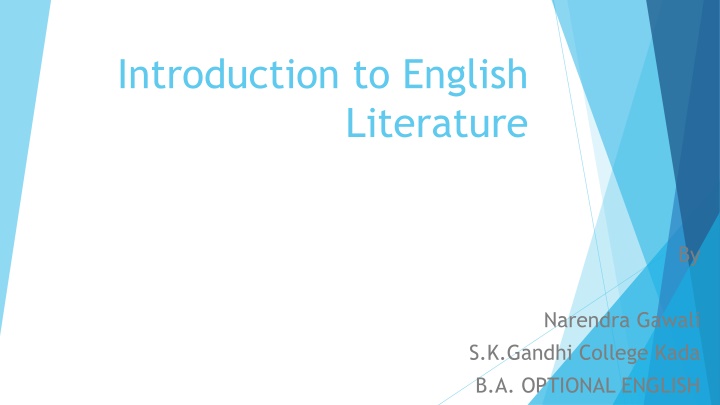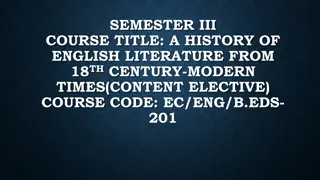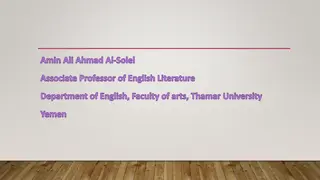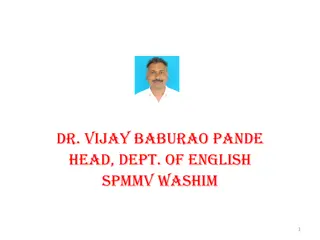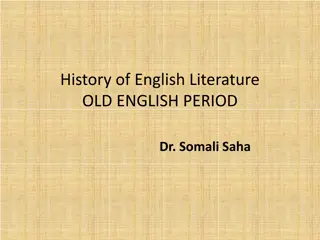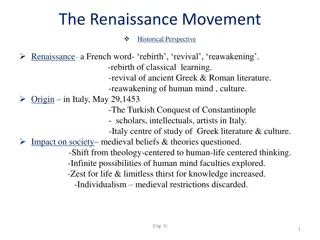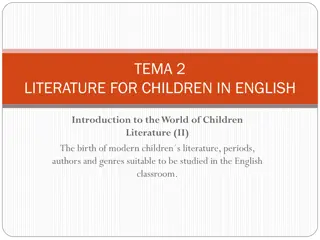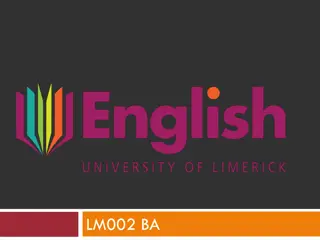Introduction to English Literature
The study and appreciation of English literature encompass the analysis of various written materials like fiction, poetry, drama, etc. This field offers insights into different cultures, enhances language skills, entertains, and broadens perspectives. Literature in English provides a platform for critical evaluation, making readers wiser and more empathetic. Understanding the importance and kinds of literature, from fiction to non-fiction, opens doors to a wealth of knowledge and experiences.
Uploaded on Mar 06, 2025 | 0 Views
Download Presentation

Please find below an Image/Link to download the presentation.
The content on the website is provided AS IS for your information and personal use only. It may not be sold, licensed, or shared on other websites without obtaining consent from the author.If you encounter any issues during the download, it is possible that the publisher has removed the file from their server.
You are allowed to download the files provided on this website for personal or commercial use, subject to the condition that they are used lawfully. All files are the property of their respective owners.
The content on the website is provided AS IS for your information and personal use only. It may not be sold, licensed, or shared on other websites without obtaining consent from the author.
E N D
Presentation Transcript
Introduction to English Literature By Narendra Gawali S.K.Gandhi College Kada B.A. OPTIONAL ENGLISH
CONTENTS INTRODUCTION Def. of Literature Importance of Literature in English Kinds of Literature Elements of story (Fiction) Elements of Poem (Poetry) Elements of Play (Drama)
Introduction The study or appreciation of Literature is very interesting and helpful to learners for many reasons. Literature in English involves the reading and analysis of written materials including fiction, non-fiction, poetry, drama etc. in English. All learners of Literature in English should be ready to analyze whatever they read critically.
Definition of literature It is very difficult offer precise definition of lit., but we shall give a working definition of literature in line with what we shall be studying in literature in English. Literature can be defined as pieces of writing that are valued as works of art, especially novels, plays and poems . This is very narrow definition of literature as non- fiction literature is not included in this definition.
Importance of Literature Reading and studying literature is very important for various reasons as pointed below: Lit improves your command of language. It teaches you about the life, cultures and experiences of people in other part of the world. It gives you information about other parts of the world which you may never be able to visit in your life time. It entertains you and provides useful occupation in your free time. It makes you wiser and more experienced person by forcing you to judge, sympathize with, or criticize the character you read about. It gives information which may be useful in other subjects, for e.g., In Geography, science etc.
Kinds of Literature Generally, lit is divided into 2 kinds, Fictional and Non-fictional Lit. Fictional lit is imaginary composed information, education and entertainment to the reader. In other words it is based on the writers imagination rather than reality. Non-Fictional literature is factual writing or writhen works that gives facts that can be proved as it provides real places, events, characters, times or reality rather than imaginary things
Kinds of literature Examples of fictional literatures include plays, poems, short stories, oral literature and songs .examples of non- fictional literature includes autobiographies, biographies, essays, diaries and journals ,magazines ,newspapers ,books such as geography, history and civics
Element of fiction Generally, fiction any form of lit that tells about imaginary, invented, made of unreal, People , places, events, short stories , novels and folktales are kinds of fiction. A Short story is story fictional prose narrative built on a plot that includes the basic situation, complications , climax and resolution. The contrast, a novel is along fictional story that uses all the elements of story telling, mainly, plot, character, settings, themes, and point of view. Oral or traditional lit has some forms of stories often told by words of mouths from generation to generation such as folktales , legends , and myths which have not been written down as stories for us to read.
Elements of fiction The story, whether is a short story, novel, or folktale has the following elements Authors Setting Plot Themes Characters Style language
Elements of fiction Setting : This is the place and time in which the story unfolds or takes place. Setting is important in understanding the background of the story or indicates in the story. If a story is well told, we will recall the setting later, long after we have put the story aside where the setting threatens the characters, it creates the conflict which is as important in fiction writing or literature. So, in interpreting or reviewing setting of a story, you may have to ask and answer such questions as : How does the setting atmosphere influence the work? Where do the events of the story takes place? When do they occur? What was the mood when the incident took place?
Elements of Fiction Plot : this is series or change of related events that tell us what happens in a story. When a plot is well mapped out, it hooks us, that is , it catches curiosity(interest) about what will happen next. A good plot draws us along after the narrator, just as a fish is hooked and played and reealed in by an expert fisherman. The first thing to recognize the plot is the nature of the hook which pulls us along and keeps us waiting. What is the hook grabs is our own curiosity, making us wonder about the outcome of a conflict. When the story is strong, you can be reasonably sure its conflict is strong.
Elements of plot CONFLICT : A conflict can be external, as when a person struggles with another person, or with an angry warthog or with a hurricane. On the other hand, a conflict can be internal, that is, it can take place inside a person s mind or heart. This might happen when a character has to make a hard decision, or struggle against fear, or resist an urge to poke his nose into everyone s business Theme : This refers to the controlling, main idea or central insight in the novel or short story. Theme answers the question What does it mean? a story s theme is often hard to state, but it is what the author means or what the reader perceives to mean by the whole story. A theme is usually stated in a sentence or statement.
Characterization Characters: These are persons or animals involved in a story in order to show entertain and show us some truth about human experience and ourselves. A good character should be alive to help us appreciate the story well. In a story, we can recognize a character by his/her/its appearance, actions and thoughts, reactions of others (what other characters say or do in relation to the character), Characterization refers to the kinds of characters the novel or short story has depending on the level of their development and involvement in the story of the book. For example, are the characters flat or round, protagonists or antagonists, major or minor, stars or backers?
Style Point of View : This refers to the style the writer of a story uses to narrate the story. In other words, writers usually chose who should tell the story or who should be the mouth piece in the story. So, you can tell the story from various angles by using points of view. There are three basic points of view often used in narratives: omniscient, third-person limited, and first-person. The omniscient (unlimited) point of view is the point of view of a god-like (all-knowing) being who has created a fictional world and who can tell us everything that is going on in the minds of all the characters. The omniscient narrator is outside the story. And in the first-person (limited) point of view , the narrator speaks as I , as a character in the story. This character can tell us only what he or she sees and hears and thinks about what is going on. In other words, the narrator is a
LANGUAGE Language is part of style but it stands out to be the most important element of any fiction writing. Literary language is often used in fiction writing to relish the story so that it is more clear, educative, informative, and indeed interesting or entertaining. Some of these language devices include figures of speech and symbolism such as images, symbols, irony, metaphors, similes, satire, and so on.
